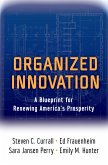"Organized" and "innovation" are words rarely heard together. But an organized approach to innovation is precisely what America needs today. This book presents a blueprint for coordinating technology breakthroughs to advance America's global competitiveness and prosperity. That prosperity is at risk. As other nations bolster technology innovation efforts, America's research, development, and commercialization enterprise is falling behind. An "innovation gap" has emerged in recent decades, where US universities focus on basic research and industry concentrates on incremental product development. The country has failed to address the innovation gap because of three myths--innovation is about lone geniuses, the free market, and serendipity. These myths blind us from recognizing our dysfunctional system of unorganized innovation. In
Organized Innovation, Currall, Frauenheim, Perry and Hunter provide a framework for optimizing the way America creates, develops, and commercializes technology breakthroughs. A roadmap for universities, business, and government, the book is grounded in the authors' seminal study of the National Science Foundation's Engineering Research Center program, which has returned to the US economy more than ten times the funding invested in it. For too long, our approach to technology innovation has been unorganized. The authors enable us to turn the page. They show us how to organize innovation for a more prosperous, hopeful future.
Dieser Download kann aus rechtlichen Gründen nur mit Rechnungsadresse in A, B, BG, CY, CZ, D, DK, EW, E, FIN, F, GR, HR, H, IRL, I, LT, L, LR, M, NL, PL, P, R, S, SLO, SK ausgeliefert werden.









